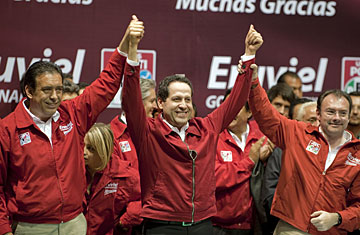
PRI candidate Eruviel Avila, center, in Mexico City on April 9, 2011, won Mexico State's election for governor this month
Not even a tropical storm and flooded streets could dampen the fiesta in Mexico State, which lies in the south-central part of the country, by the nation's former ruling party. Oblivious to the pelting rain, revelers dressed in the red of the Institutional Revolutionary Party (PRI) danced into Monday morning among balloons, banners and the beat of tropical music. "Yes, we could do it," they screamed, echoing a chant normally used in Mexican soccer stadiums. The PRI has plenty to celebrate. Its candidate Eruviel Avila won the July 3 election for governor in the most populous state in the country by a margin of more than 40 percentage points, according to preliminary counts. It also comfortably won the Pacific state of Nayarit, and Coahuila, which borders Texas.
Such soaring victories are reminiscent of the past century, when the PRI held the Mexican presidency for 71 years straight until 2000. As the red-clad partiers celebrated into the wee hours, they shouted that the PRI will retake the presidency next July, when Mexicans are scheduled to vote for the top job. Mexico State, which is made up of the slums of Mexico City, luxury suburbs and indigenous villages, is considered a microcosm of the nation. Its elections are said to be a laboratory for the national political strategies. Indeed, the PRI, the party whose government was dubbed "the perfect dictatorship" by Nobel Prize winner Mario Vargas Llosa, may be back.
Of course, a year is a long time in politics. The PRI also won the governorship of Mexico State back in 2005, only to come third in the 2006 presidential race. But there are factors that show the latest triumph is a much more serious signal. The PRI achieved its crushing victory while the other two major parties hardly showed up. Incumbent President Felipe Calderón's conservative National Action Party, or PAN, had originally considered an alliance with leftists to stop the PRI resurgence. But the deal was done in by hard-liners on both sides. PAN's gubernatorial candidate Luis Felipe Bravo Mena campaigned very much alone while the big hitters of his party stayed away. He finished with a paltry 12%, according to the early count. The candidate of the leftist Party of the Democratic Revolution, Alejandro Encinas, had a disappointing day too, polling 21%. The PRI's Avila ran away with 62 points.
The PRI also successfully staged a makeover with the victory of the youthful Avila, 41, whose telegenic clean-shaven appearance won younger voters when set against Encinas and Bravo, both bearded and in their late 50s. Avila succeeds the man who is now the most promising presidential candidate: outgoing governor Enrique Peña Nieto, 44, who has Hollywood looks and a soap-opera-star wife, Angélica Rivera, to match. Peña Nieto leads opinion polls for the 2012 presidency and received a major boost from Sunday's landslide with the election of his anointed candidate. The youth vote is particularly important for the PRI because the party has long been characterized as a dinosaur from an antiquated authoritarian era. But polls from Mexico State showed that its support among first-time voters was even higher than among voters overall.
Critics retort that the dinosaur has simply put on makeup. While being fresher and better looking then the PRI barons of old, many fear that the young turks are just as authoritarian. The losing candidates in Mexico State accused the PRI of electoral shenanigans, including buying votes with free lunches, T-shirts and envelopes stuffed with cash. "I do not know of any democratic country in the world where the elections can be won by 40 points," Manuel Camacho Solis of Encinas' campaign told TIME. "This election resembles the last Honduran election." (Honduras' 2009 election followed a military coup against President Manuel Zelaya.) Camacho Solis promised they will challenge the vote in court. Calderón's PAN also found the scale of the PRI victory hard to swallow. "This was achieved through manipulations, blackmail and coercing the vote from citizens," said PAN representative Francisco Gárate. But as the PRI winners opened their champagne bottles, they said the losers were just eating sour grapes. "The opposition tries to justify their defeat, as usual, [by] blaming it on the others. Instead they should be looking at their mistakes and trying to learn from them," said Cesar Camacho, who represents the Avila camp. "In a democracy you should accept defeat when you lose."
Another crucial factor in the PRI comeback is Calderón's flailing war on drug cartels. While the crackdown proved popular in its first year, the toll of the campaign — 40,000 drug-related murders, some 10,000 missing people and daily shoot-outs — has led many to call for a way out. "I know [the PRI] are bad, but Calderón is much worse," said unemployed graduate José Antonio Ojeda, 22, as he cast a vote for Avila. "Look how many people [Calderón] has killed, and now the military are always stopping us [young people] just because of our looks." Reinforcing the drug war, federal police raided a Mexico State town on election day itself to seize wanted narco capo Jesús Enrique Rejón Aguilar, who is accused of being No. 3 in the bloodthirsty Zetas cartel.
Calderón has retorted that the PRI governments were the ones who let drug traffickers grow into such a threat in the first place. On a trip to Stanford University in California last month, Mexico's President lashed out at the PRI for corruption and violence under its rule. "For many decades, that one party controlled everything: what the media was allowed to say, what the schools should teach, which rock concerts were permitted. Everything," Calderón said. "When students just like you protested, they were massacred." Such intense emotions are omens of a searing race for the presidency in 2012.
